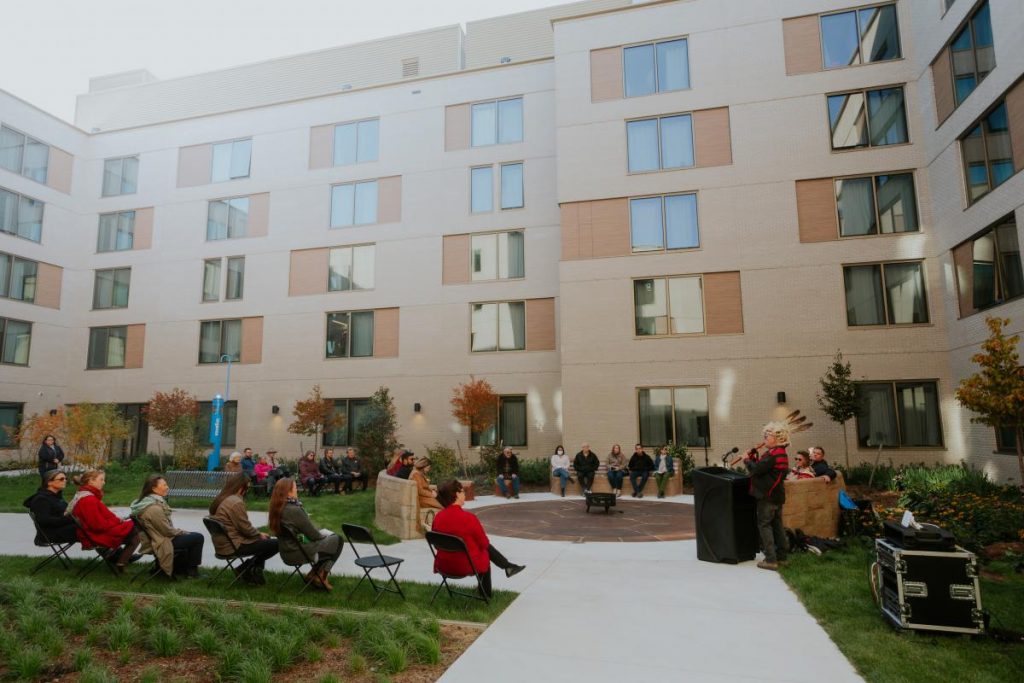Canada (Queens University) New indigenous gathering space officially unveiled

If you were to look down from above the new Albert Street student residence, your eyes may be drawn to a striking feature in its courtyard. As if surfacing in a pond, the rugged, russet shell of an immense stone turtle appears to emerge from the ground. Stretching six metres across, its circular form acts as the centre of a unique, new Indigenous gathering space — a place for campus community members to nurture good minds and open hearts.
“The turtle shell represents Mother Earth,” says artist Tehanenia’kwè:tarons (David R. Maracle), who designed the space, and whose Mohawk name means Cutter of Stone. “It reminds us to walk softly on her — on the back of the great turtle — during our time here. It is a place of grounding that allows good thoughts to be received as good medicine; Medicine we can share with others as we travel this living planet.”
Mother Earth is one of many important Indigenous symbols of knowing and being represented in the space, all of which present visitors with opportunities for calm reflection.
Visitors to the space are encouraged to enter the area traveling counterclockwise around the shell. This is the traditional direction of movement in Haudenosaunee ceremonies and is connected to their story of the Skywoman, who moved in this way when planting the seeds of sacred medicines and foodstuffs on the turtle’s back — seeds that also grew into humankind.
Like turning back the hands of time, visitors moving around the space in this manner will encounter large, stone benches encircling the shell. Maracle, who is a member of the Bear Clan of the Mohawks of the Bay of Quinte, says these represent the bones of ancient Indigenous ancestors and offer places for rest and contemplation.
Along the backs of each bench stretches the pattern of the Tékeni Teyohá:te Kahswéntha, or Two Row Wampum belt. Comprised of two dark parallel lines on a white background, the Two Row Wampum dates to 1613 and marks the first agreement between the Haudenosaunee and Dutch settlers.
“The Two Row Wampum belt signals the groups’ promise to live in peace, while pursuing parallel but separate paths of culture, belief, and law,” says Maracle, whose concept was realized with the help of Matt Fair, general manager of Research Casting Institute, whose team aided in design and fabrication of the space’s features. “The dark lines represent a ship and a canoe floating side-by-side on the river of life, and the three white rows symbolize friendship, good minds, and peace. Together, the Tékeni Teyohá:te Kahswéntha is considered the basis of all treaties by the Haudenosaunee people.”
A dedication ceremony was held on Oct. 21, 2022, to mark the official opening of the space. Guests joined Queen’s senior leaders and Office of Indigenous Initiatives staff for the occasion and were treated to special remarks on the space’s artistry and importance, traditional Indigenous foods, and a musical performance by Maracle.
The incorporation of an Indigenous gathering space into the newly-opened student residence building is one facet of the university’s wide-ranging effort to decolonize and Indigenize campus life.
“Put another way, this work seeks to deconstruct and reflect on the impacts of colonization to help both Indigenous and non-Indigenous members of the Queen’s community begin to understand where we came from and where we are going,” says Kanonhsyonne (Janice Hill), Associate Vice-Principal (Indigenous Initiatives and Reconciliation). “From there, we must elevate Indigenous voices, cultural practices, and ways of teaching and learning, so that they may take their rightful place among the plurality of knowledge that underpins a truly inclusive education.”
Indigenous spaces, art installations, and historical displays can be found across campus — many of which can be located on the interactive campus map. Creation of these and new spaces is part of ongoing work by the university to realize recommendations made by its Truth and Reconciliation Commission Task Force in its 2015 final report, Yakwanastahentéha Aankenjigemi (Extending the Rafters). One of the most notable spaces transformed through this work is the Four Directions Indigenous Student Centre (4D), which opened an expanded facility in 2018 — doubling its original size — to better welcome, serve, and engage the Queen’s growing number of Indigenous students.
The university continues to act on the Extending the Rafters report, which goes beyond physical spaces to include recommendations on improving Indigenous access to education, inclusive curriculum development, new and improved services and supports, and many others. Queen’s releases yearly progress reports highlighting this ongoing work.
